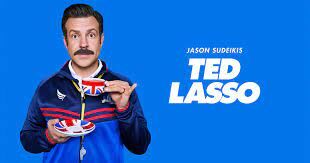Happiness
The Ted Lasso Prescription
Was this show created in a happiness lab?
Posted October 22, 2021 Reviewed by Ekua Hagan

You know how sometimes you don’t realize who was making the party go until after they’ve left?
Now that Ted Lasso has wrapped its second season, and lots of us are feeling withdrawal symptoms, I reckon it’s worth digging into how this goofy little show worked its earnest magic. It’s as if a team of positive psychologists in some happiness lab had been tasked with making a universal vaccine against the multiple cultural viruses now in the air. (And oh, by the way, maybe layer in a little moral instruction as a booster.)
In case you sat this one out, Ted Lasso is about a small-time American football coach — a sunny golden retriever of a man — who’s brought to Britain to helm a professional British soccer club. The show scatters lessons like confetti: lessons for men on how to be men; for countries on how to organize their government; for the whole world on how to bear up gracefully in crappy circumstances. Ted Lasso — the man, the cable-television confection — is everybody’s personal life coach. Let’s look at some of the social science that’s propping it all up.
A sense of progress
The team Ted inherits, Richmond AFC, is heading in the wrong direction. After a dismal first season, and further arrested development in the second (a record-breaking string of tie games), a psychologist named Sharon Fieldstone is brought in to get the whole wagon train unstuck. And that’s when Ted Lasso becomes more or less explicitly about mental health.
One of the biggest predictors of personal happiness — at least in the West — is a sense of progress. We need to feel we’re moving forward, however slowly, as Harvard’s Teresa Amabile and others have shown. Basically, we’re all facing “relegation” all the time. To Ted, small wins in the life column count more than big wins on the scoreboard. (He’s banking on one leading to the other.)
Coping mechanisms
Ted drops Dad jokes onto moments of tension the way water bombers drop retardant onto forest fires. Cornball humor is his go-to move. But as George Vaillant pointed out, some coping mechanisms are healthier than others. Sharon believes Ted’s reflexive folksy yuks are a crutch to avoid confronting his emotions, and she calls him on it. Which leads to …
Catharsis
Near the end of season two, Ted trusts Sharon enough to reveal the secret source of his buried pain (and guilt). The scene is a gusher, and the moral is a repeating theme of the show: The truth shall set you free. Emotional catharsis is standard TV fare, but feeling your feelings is almost the point of Ted Lasso. Because that is the project of humans — notably men — in the twenty-first century.
The power of ritual
Rituals can create meaning and connection, boost performance, strengthen group bonds and just generally impose a sense of order on the chaos of life. So it’s no surprise that ceremonial moments come fast and furious in and around Richmond AFC — from ritual haircuts to job promotions to exorcisms (to drive out bad juju from the clubhouse). The context is always intimate enough, the mutual trust strong enough, to ensure sufficient psychological safety for everyone to let down their guard.
One of Ted’s own protection rituals is to give a tiny plastic army man from his collection to someone in his inner circle, right at the moment they need it. (Only once does the gesture fall flat, and this too becomes a teachable moment for Ted. The recipient is Richmond defender Sam Obisanya, who returns the gift. He’s from Nigeria, and for him, the American army doesn’t have quite the same positive associations. No offense.)
Small acts of kindness
From day one, Ted meets unkindness with kindness. When they go low, he goes high. The homemade biscuit is mightier than the sword. This is the very DNA of the show. Kindnesses are revealed within the hearts of even the crustiest characters. In the real world, research bears out the obvious: Kindness is a kind of superpower. It just … works — for both sides of the equation.
The power of story
Ted takes a rabbinical approach to press conferences: he answers questions with stories — teaching tales, really. He’s got a million of ‘em, curated on the fly for maximum impact. Great coaches actually do have this skill. So do great parents. And great teachers. Because stories, plenty of research shows, are the best way to make your point stick.
Collective effervescence
When the joy goes out of the game for the hulking Richmond captain Isaac McAdoo, Ted has him scrub into an inner-city game in his old neighborhood, where he rediscovers the sheer bliss of getting lost in what you love to do. Playing together is a tonic. Football is life! And Teamwork makes the dream work, as Herr Lasso might say.
The rift-mending joint mission
The most popular sport on Earth is a metaphor for a world torn by ethnic and political tensions. Last summer, the Yale political scientist Salma Mousa published a study testing whether positive contact with rival group members might sow more tolerant attitudes and behaviors. Her subjects were Iraqi Christians who had been displaced by ISIS. She recruited these men to play pick-up soccer. The control group was assigned to an all-Christian team. The experimental group was put on a mixed team of Christians and Muslims. The results? “Christians with Muslim teammates were more likely to vote for a Muslim (not on their team) to receive a sportsmanship award, register for a mixed team next season, and train with Muslims six months after the intervention.” (There were limits, though, to how far the new tolerant vibe extended outside of the soccer pitch.) When they’re really cooking, Richmond AFC, a team made up of players from at least six countries (their cultural quirks mined for laughs) functions more like a blended family than a mercenary enterprise. We can dream.
The palliative of nostalgia
For Richmond’s beleaguered staff, every pop-culture reference from the ‘70s and ‘80s lands like a potato chip – a dopamine-tickling hit of salt and fat. Works for them, works for the show’s Boomer-heavy audience. Nostalgia is comfort food: Some evidence suggests that we’re most likely to indulge when we’re feeling low …
The risky cliff-dive of sincerity
On the last day of the season, former teammate Jamie Tartt, a talented but selfish player who’s now a star striker for a rival club, has just knocked Richmond out of the Premier League. As his team bus pulls out of the parking lot, Jamie opens an envelope his old coach has slipped in his gear. One of those little army men falls out. And there’s a note. “Way to make that extra pass… – Ted.”
Ted Lasso too made the extra pass, over and over again. The generous play is a risky gambit in an era where generous people are often taken for dupes. The fear of looking uncool is a powerful deterrent — it lulls many of us into a pose of heavily defended irony. A show that flirts with sentimentality — or worse, straight-on dorkishness — well, a show like that has stones the size of soccer balls.
Right now, we need nothing less.




